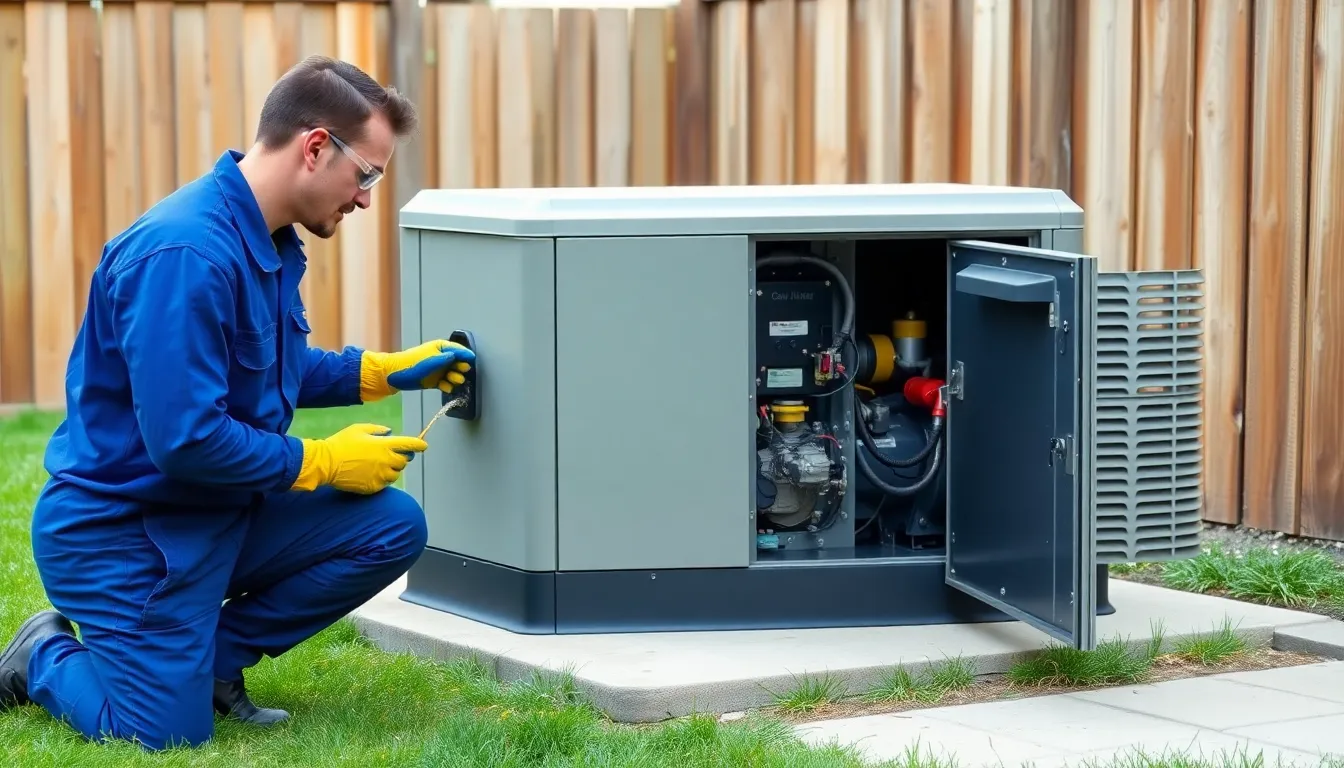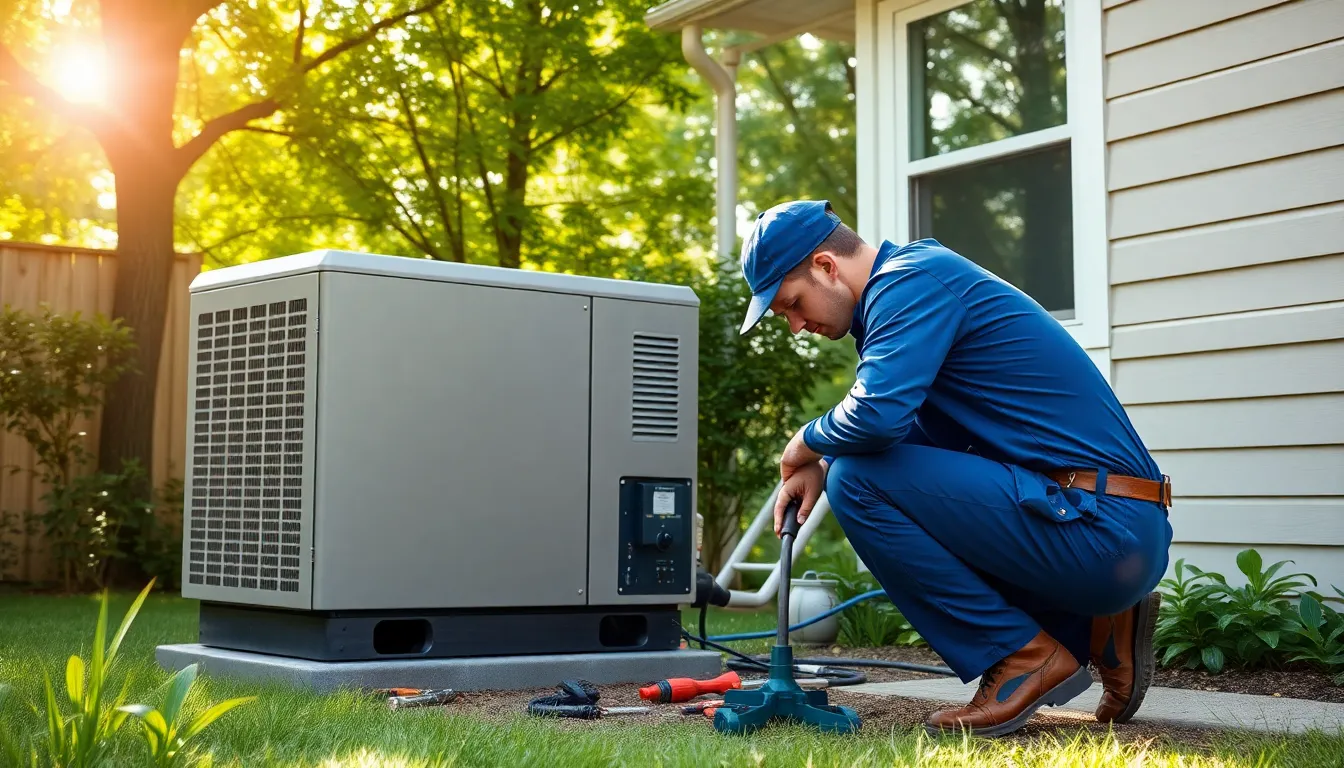When the lights flicker and the storm clouds roll in, a whole home generator becomes the hero of the hour. But just like a superhero needs a sidekick, your generator needs regular maintenance to keep it in tip-top shape. After all, nobody wants to discover their power-saving pal has taken a vacation when the power goes out!
Table of Contents
ToggleImportance of Whole Home Generator Maintenance
Whole home generator maintenance plays a crucial role in ensuring reliability during power outages. Neglecting routine maintenance can lead to mechanical failures or performance issues when it’s needed most. Regular check-ups prevent small problems from escalating into significant repairs, saving homeowners time and money.
Generators should receive servicing at least once a year. Annual inspections include checking the battery, oil levels, and fuel systems. Additionally, cleaning or replacing air filters enhances airflow and efficiency.
Ignoring these maintenance tasks increases the risk of operational failures. If a generator operates under duress, it can result in higher fuel consumption and decreased longevity. Regular maintenance ensures that parts function correctly, which keeps energy supply steady and dependable.
Moreover, maintenance verifies that generators meet local safety codes. Compliance with these regulations lessens the risk of hazards such as carbon monoxide poisoning or electrical fires. Peace of mind comes from knowing that the generator operates safely.
Investing in professional maintenance services guarantees thorough analysis by experienced technicians. These experts can identify hidden issues and recommend corrective actions before they become costly repairs. Homeowners should consider documenting service records for warranty purposes and future references.
The importance of whole home generator maintenance cannot be overstated. Consistent care keeps generators running smoothly, ensuring power remains available when it’s essential. Engaging in routine check-ups reflects a responsible approach to home energy management.
Key Maintenance Tasks

Regular maintenance tasks ensure a whole home generator operates efficiently and reliably. Key tasks include inspecting the oil level, checking the battery, and cleaning the air filter.
Inspecting the Oil Level
Inspecting the oil level ensures proper lubrication for engine components. Low oil levels can lead to overheating and serious damage. During maintenance, technicians examine the oil and may replace it if necessary. They focus on using the manufacturer’s recommended oil type for optimal performance. Checking the oil level every few months helps prevent unexpected failures. Oil changes must occur at least once a year or after a specified number of operating hours.
Checking the Battery
Checking the battery is crucial for system reliability. A weak or dead battery can prevent the generator from starting during power outages. Technicians assess connections and clean corrosion from terminals, ensuring good contact. They may also test voltage levels to confirm battery health. Replacing the battery every three to five years maintains optimal functionality. Regular checks can identify issues early, preventing inconvenient failures.
Cleaning the Air Filter
Cleaning the air filter promotes efficient combustion and engine performance. A clogged filter restricts airflow, causing the generator to work harder and use more fuel. Technicians clean or replace the air filter every six months or based on usage. Ensuring proper airflow reduces wear on internal components and extends the generator’s lifespan. Performing this task regularly supports the generator’s overall efficiency and dependability.
Schedule for Regular Maintenance
Regular maintenance keeps whole home generators functioning effectively and reliably. Adhering to a maintenance schedule reduces the risk of unexpected breakdowns, especially during power outages.
Monthly Maintenance Tips
Inspecting the generator monthly enhances its reliability. Checking fuel levels ensures adequate supply during outages. Monitoring the battery’s condition helps avoid startup issues. Cleaning the exterior prevents dirt from clogging vital components. Listening for unusual sounds during operation can indicate underlying problems. Lastly, running the generator briefly keeps it in good working condition and prepares it for emergency deployment.
Annual Maintenance Checklist
Conducting an annual maintenance checklist helps maintain optimal performance. Changing the oil and replacing the oil filter prevents engine wear. Replacing the air filter improves air intake and combustion efficiency. Testing the battery’s voltage extends its life and guarantees reliability. Checking the fuel system, including filters and lines, eliminates debris that could obstruct fuel flow. Lastly, conducting a load test simulates real-world operation conditions, ensuring the generator performs under strain.
Common Issues and Solutions
Whole home generators face common issues that can hinder performance. Mechanical failures often stem from inadequate oil levels. Regularly inspecting oil ensures proper lubrication. Overheating leads to significant damage, and conducting oil changes at least once a year mitigates this risk.
Batteries can also become problematic. A weak battery prevents the generator from starting, especially during power outages. Checking the battery’s condition should occur routinely, and replacing it every three to five years maintains reliability.
Air filters deserve attention too. Clogged or dirty air filters impede efficient combustion and reduce engine performance. It’s advisable to clean or replace the air filter every six months or based on usage to promote smooth operation.
Fuel system issues can arise as well. Contaminated fuel can cause starting problems. Regularly inspecting fuel levels and quality helps ensure a reliable fuel supply.
Noise during operation may signal underlying problems. Unusual sounds can indicate issues with the generator’s components. Listening for strange noises is part of routine maintenance, allowing for early detection of potential failures.
The maintenance schedule includes a robust set of tasks. Monthly checks involve monitoring fuel levels, inspecting the battery, and keeping the generator clean. An annual checklist recommends conducting oil changes, air filter replacements, battery voltage tests, and load tests to verify performance standards.
Staying proactive with generator care is essential. Scheduling professional inspections enables technicians to identify hidden problems, ensuring functionality during emergencies. Prioritizing maintenance prevents operational failures and ensures whole home generators perform at their best when called upon.
Regular maintenance of whole home generators is vital for ensuring they perform reliably when needed most. By adhering to a structured maintenance schedule and addressing key tasks, homeowners can prevent costly breakdowns and extend the lifespan of their generators. Proactive care not only enhances operational efficiency but also ensures compliance with safety standards, significantly reducing risks associated with power outages. Investing time and resources into maintenance ultimately safeguards a home’s energy management, providing peace of mind and security during unexpected power interruptions.



